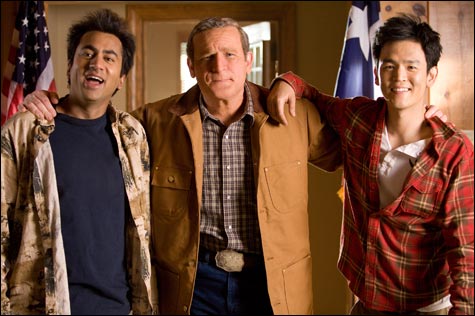
REGULAR GUY: James Adomian’s Dubya hangs with Kumar (Kal Penn) and Harold (John Cho) just before (or after?) passing that joint in Harold & Kumar Escape from Guantánamo Bay. |
How is it that the least popular and possibly worst chief executive in American history has inspired no lasting impersonations? Josh Brolin’s performance in Oliver Stone’s W., which opens this Friday, will have little competition for best imitation of the 43rd president. Even the innocuous Gerald Ford was better served by Chevy Chase’s pratfalls. But as I survey the past eight years, not many funny, memorable, or pointed TV or movie parodies of George W. Bush come to mind. How could such ripe material be neglected for so long?
It didn’t look that way during the 2000 presidential campaign, not with SNL’s Will Ferrell rendering George W. as a language-mangling fratboy idiot. But once Bush got into office, Ferrell shied away, fearing typecasting (anyone remember Vaughn Meader?), and in 2002 he left the show to pursue his film career. He has since reprised his Bush imitation (still the funniest and edgiest) on occasion; he drew on it for his NASCAR driver Ricky (“If you’re not first, you’re last!”) Bobby in Talladega Nights (2006).

Meanwhile, South Park’s Trey Parker and Matt Stone, who planned before the election to produce a sit-com centered on whichever candidate won (they were pretty sure it would end up being called Everybody Loves Al), debuted That’s My Bush! in the spring of 2001. Timothy Bottoms played the Ralph Kramden–like president. Avoiding any real political content, emphasizing slapstick, it lasted eight episodes. And plans to turn the premise into a feature movie didn’t seem like such a good idea after 9/11.
The War on Terror might not have brought about the end of irony, but it sure put a damper on parody. So except for sporadic bits, Bush got a free pass not only from the news media but also from the world of entertainment. Not till 2004 did a Bush-like character reappear on the screen. Dickie Pilager (Chris Cooper), the not so subtly named Colorado gubernatorial candidate in John Sayles’s Silver City (2004), played on the image of Bush as dolt but made him more victim than perpetrator, a well-meaning puppet of malignant forces that include his US senator dad, a power-hungry corporate mogul (the head of “Bentel”), and a Cheney-esque svengali played by Richard Dreyfus (a warm-up for his role as the real Cheney in W.).
Bush as sympathetic dupe returns in Chris Weitz’s ill-fated satire American Dreamz (2006). George W. stand-in President Staton (Dennis Quaid) awakes the morning after re-election with an urge to read the New York Times and is shocked to learn there’s all kinds of “stuff” in there he didn’t know about. Dismayed, his Cheney/Rove-like handler (Willem Dafoe) cuts him off from reading material, puts him on pills, and tells him what to say through an earpiece. If only Bush/Staton could be himself, is the implication, his regular-guy decency might win the day.
The movie, however, lost big-time at the box office, and, Comedy Central’s animated satire Lil’ Bush aside, Bush-like figures would afterward appear on screen only in cameos. In these, when he isn’t fucking over the world, he’s invariably a cool guy to hang with, whether eating Ho-Hos in Transformers (2007) or passing a joint in Harold & Kumar Escape from Guantánamo Bay (2008).
Now he must reckon with Oliver Stone, who in interviews discussing W. has likened his hero to those in Shakespeare’s tragedies. I have my doubts. A tragic hero usually comes to some kind of self-recognition by the end of the drama; Bush remains proudly unaware. And usually the tragic hero is sacrificed for the community, not the other way around. The Bush administration was tragic for everyone but him. And in the end it was no laughing matter.